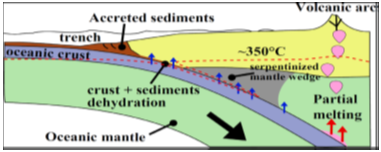


|
Materials Under Extreme Conditions: Geological Fluids
The Department of Physics at the University of Bath (UK) and the Institut Laue-Langevin (ILL, Grenoble, France), jointly invite applications for a three-year PhD programme focusing on Materials under extreme conditions (Geological fluids)
Brief Description of the Project Aqueous ionic solutions under high pressure (P) and temperature (T) conditions form a class of geological fluids that are of fundamental importance for understanding many of the geophysical processes that take place within planet Earth.† A prerequisite for developing realistic atomistic and thermodynamic models of these liquids is detailed knowledge about their structures.† For example, it is necessary to know the speciation (type and quantity of the different ionic configurations) at high P and T in order to understand equilibrium processes and the way in which these processes are perturbed by e.g. the addition of CO2, an important issue in sequestering green-house gas.
The overall aim of this PhD project is to solve the structure of several geological fluids by using the powerful method of neutron diffraction with isotope substitution to measure the coordination environment of selected ions in solution.† The diffraction experiments will be made under extreme high-pressure and high-temperature conditions.† Part of the experimental setup, involving the Paris-Edinburgh press, has already been developed and tested for neutron diffraction experiments.† The other part of the setup will require the development of apparatus to cover a lower pressure but higher temperature range.† There may also be the possibility for investigating the dynamical properties of geological fluids by using inelastic neutron scattering.† All of the experimental results will be used to inform the development of appropriate molecular dynamics models.
Applications The PhD project will be located in Grenoble (France), at the ILL, and at the University of Bath. The successful candidate will be employed for a period of up to three years, with a gross salary of around 2350 Ä/month, together with other benefits depending on the studentís social status (for more details see: here). An international team of experts, including Prof. Philip Salmon (Bath), Dr Anita Zeidler (Bath), Prof. Stefan Klotz (Paris) and Dr Henry Fischer (ILL), will supervise the work of the PhD student.
Applicants should have a degree in chemistry or physics or in a related discipline. Academic knowledge of the subject area will be appreciated.
Please contact Professor Phil Salmon (pyspss@bath.ac.uk) or Henry Fischer (fischer@ill.fr) for further information on the project - webpages Bath or ILL |
|
Recycling of continental crust at a subduction zone showing the release of fluids during dehydration of the down going oceanic crust and sediments. These fluids lead to the serpentinization of the mantle wedge i.e. to the transformation by hydration of the mineral olivine (one of the main mantle components) into serpentine rock. |
